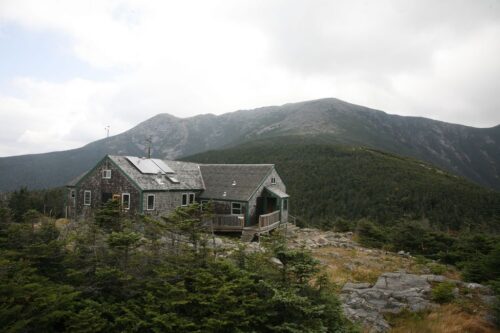Being productive while socially isolated is overrated. Surviving is good enough
While the worst of our isolation is easing, remember the value of simply staying alive to be here for each other.
The Boston Globe By Miles Howard
May 23, 2020

Mountain lodges, such as this one overlooking the Franconia Range, can teach you a lot about isolation. Photo by HERB SWANSON.
Like most of us, I’ve been stuck indoors for two months. But despite Governor Baker’s plan to reopen the state, I’m in no hurry to get back out. As hundreds of Massachusetts residents continue to die from COVID-19, something has crept into my mind and body — a tremor of disintegration that I hadn’t felt for eight years. The last time it shuddered through me, I was living alone, deep in the White Mountains of New Hampshire.
In the Whites, there are rustic cabins where hikers can prepare their own meals and spend the night in bunk beds. These dwellings are owned by the Appalachian Mountain Club, and they’re known as “the huts.” Each hut is staffed by a live-in caretaker whose job involves lighting the woodstove every night, dumping wood chips into the composting toilets, and making sure that guests don’t incinerate the hut while using the communal kitchen. It’s a seasonal job, lasting a couple of months. It was my job, before I moved to Boston and became a freelance journalist.
I’ve had a thing for peat moss and hemlock spruce since I was old enough to leave my parents’ backyard. That’s what drove me to the huts in 2012. I had been working for a magazine, writing listicles for people who could blow the equivalent of one week of my salary on a gemstone massage. When the zine ran out of money, I wanted to escape to a more rugged place, with the freedom to write, read, cook, or roam wherever I wanted. I felt this would make me a better person. Caretaking leaves room for these things. It’s basically Jack Nicholson’s job in “The Shining,” but with more mouse turds.
Each shift began on a Friday. I’d hike into the Whites with a backpack of groceries and arrive at my hut to find it teeming with Boy Scout troops and IBM workers from the Boston area. After 48 hours of belly laughs and bad spaghetti, the crowds would depart. I’d have the hut to myself. It wasn’t unusual to go six days without seeing another soul. Solitude can seem alluring when you’re leading a cacophonous lifestyle. But I had never been alone like this.
The novelty of being on my own burned off faster than the kindling I’d feed into the woodstove each night. When there were no guests, I’d stay in bed beyond breakfast time, paralyzed by the “nothing” of my day ahead. Save for some chores (splitting firewood, sweeping the floors) there wasn’t much to do. I felt confused. I had intended to spend this time pursuing industrious self-improvement goals. But I couldn’t channel the energy to do these things. All that I could do was get out of the hut. I would go on long walks, collecting birch bark that could be used for fire starter. I would stare at streams and bogs for half an hour. One day, I met a pine marten who began making appearances on the hut porch. I called him “Steve Marten” and started projecting personality traits onto him. When he stopped showing up, I was devastated.
I felt like I was going insane sheltering in place, deprived of human contact. Granted, I knew when my solitude in the woods would end. But surviving it: that was the looming challenge. And one day, after nearly contracting frostbite on a hike that turned snowy, I decided that survival, alone, would have to be my new purpose. This wasn’t easy to accept. We live in an age when “meaning” is too often derived from “productivity.” But surviving is what humans have been doing for centuries. The natural world keeps coming up with ways to break us and remind us of that, and I had become reacquainted with it.
Overnight, life changed. Deciding that survival was enough seemed to imbue little things with grandiosity. I would wake up looking forward to cooking a box of mac and cheese at sundown, or leafing through an old Tintin book that a guest had left behind. I did my hut-keeping chores more carefully. I even wrote a little some days. And when hikers did appear, releasing me from my solitude, I could talk with them, assist them, and simply be there with them. One evening, listening to some Quebecois hikers playing a guitar and singing Leonard Cohen songs on the same corner of the hut porch where Steve Marten used to come visit, I had myself a good cry.
This spring, listening to my neighbors’ kids screeching in their yard, hearing the occasional wail of an ambulance, I have felt like I was standing on that porch again. For the second time in a decade, I’ve had to be OK with just surviving. I hope that more of us can become OK with that. Even though the worst of our isolation is easing, more lockdowns might come. We’ll need to remember that sometimes, surviving is all that most of us can do — for ourselves, and for each other. When the isolation passes, we will need each other more than we know.
Miles Howard is a journalist in Boston. Follow him on Twitter @milesperhoward.
He is also the co-editor of the Old Hutcroo Association newsletter.
